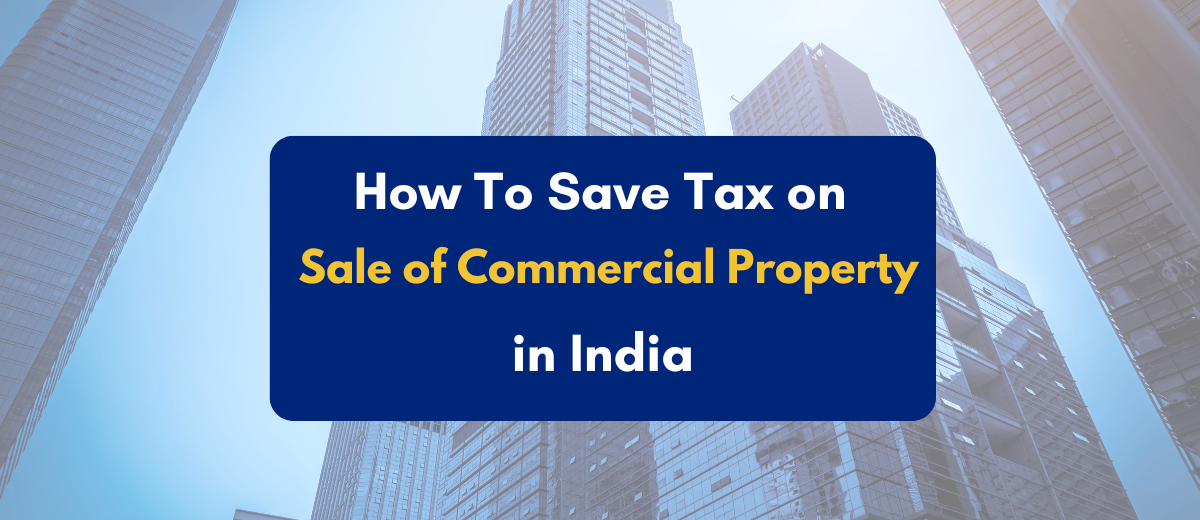Written By – PKC Desk, Edited By Karunakaran, Reviewed By – Aakash
Selling your commercial property? Explore with us the best of how to save tax on sale of commercial property.
Save thousands on taxes when you sell your commercial property. Learn the insider tips and tricks to optimize your financial outcome.
Breakdown of Taxation on Sale of Commercial Property
When you sell a commercial property in India, you are liable to pay certain taxes. Here’s a quick breakdown of the same:
Capital Gains
The profit or the capital gains from the sale of commercial property is taxed under the Income Tax Act, based on two types of holding period:
- Short-Term Capital Gains (STCG) is applicable if the property is held for less than 24 months.
- Long-Term Capital Gains (LTCG) applies when the property is held for more than 24 months.
Goods and Services Tax (GST)
The GST for sale of commercial property in India depends on whether the property is ready-to-move-in or under construction.
While there’s no GST on ready-to-move properties, those under construction are liable to pay 12% GST on the sale.
TDS
When the sale is more than Rs. 50 lakhs, the buyer is required to deduct 1% TDS on the sale price. This TDS is adjustable against the seller’s final tax liability.
How to Save Tax on Sale of Commercial Property: 11 Top Strategies to Adopt
Now that you’ve understood the tax implications of the sale of commercial property, here are some of the best ways to minimize your liability:
Consider the Holding Period & Indexation Option
The duration for which you own the property can impact your capital gains tax.
Short-term capital gains (STCG)for properties held under 2 years are taxed at the individual’s income tax slab rates
Those held for more than 24 months qualify for long-term capital gains (LTCG). As per the new rules, you have an option of selecting the tax rates for property acquired before 23rd July 2024:
- A tax rate of 12.5% without indexation
- A tax rate of 20% with indexation benefit.
Choose the option that minimizes your tax liability
Invest in Residential Property
Section 54F of the Income Tax Act, exempts you from capital gains tax if the entire sale proceeds from a commercial property are reinvested in a residential property
This investment must be done within a specific time frame- one year before or two years after the sale, or within three years for construction.
Professional Guidance and Planning
Engaging a tax professional or firm like PKC Management Consulting can help you take the best advantage of potential deductions and exemptions.
A qualified advisor will align your tax strategy with your financial circumstances, maximizing tax savings.
Structure the Sale as Installments
You can structure the sale as an installment spreading the tax liability over multiple years.
This method allows you to keep your income within lower tax slabs and reduces the overall tax burden.
Plan the Sale for a Low-Income Year
If possible, plan the sale of your commercial property in a year where your overall income is lower, or there are higher deductions available.
This strategy works best for short-term capital gains, as they are taxed based on your income tax slab rate.
Account for Expenses on Sale and Transfer
The expenses you incur on selling the property, such as broker fees, legal charges, transfer fees, registration charges can be deducted from the total sale proceeds.
This deduction lowers the taxable amount, thereby reducing the overall tax burden.
Investment in Specified Bonds
Investing in specified bonds (usually a lock-in period of 5 years) under Section 54EC can provide tax exemptions on capital gains.
The investment must be made within 6 months of the property sale. The maximum exemption is capped at INR 50 lakh.
Schedule a free property review by our experts!
Offsetting capital gains with capital losses
Capital losses from other investments can offset capital gains. This reduces your overall tax liability.
This strategy allows property owners to minimize taxable gains by utilizing losses incurred in other areas of their investment portfolio.
Joint Ownership
Consider transferring the property to family members (like a spouse or children) to leverage their tax benefits.
This strategy can help in utilizing their tax slabs and exemptions effectively, though it requires careful legal and financial consideration.
Claim Expenses
If the property is rented out, you can claim deductions on expenses related to maintenance, and repairs.
This can further reduce taxable income derived from the property.
Carry Forward of Losses
If capital losses exceed capital gains in a given year, the losses can be carried forward to offset future gains.
This strategy can be beneficial for property owners looking to minimize tax liabilities in subsequent years.
Explore Property Exchange
Under Sections 54B and 54D, property owners can engage in property exchanges, which can defer tax liabilities.
This is particularly useful for those looking to swap one property for another without incurring immediate tax consequences.
Deduct Loan Interest Payments:
Interest paid on loans taken for purchasing or improving commercial properties can be deducted from taxable income.
This deduction can significantly reduce the overall tax liability associated with income generated from the property.
Capital Gain Account Scheme
For individuals unable to reinvest the sale proceeds immediately, the Capital Gain Account Scheme allows them to deposit the funds in an account.
The amount must be utilized within a specified timeframe for purchasing or constructing a new property to avail of tax exemptions
Also Check: Save Tax On Sale Of Ancestral Property
Frequently Asked Questions
If you hold the property for more than 24 months, any profit is considered LTCG and if you hold the property for less than 24 months, any profit is considered STCG. They are both taxed differently.
Yes, you can claim deductions for expenses incurred in connection with the sale, such as legal charges, transfer fees and property valuation costs. You may be eligible for deductions under Section 80C for investments made in certain financial instruments.
Yes, you will still be liable to pay capital gains tax, but you may be able to claim exemption under Section 54D if you reinvest the proceeds in another capital asset within two years.
The cost of improvements is added to the cost of acquisition, which reduces the taxable gain. So, make sure to keep accurate records of all improvements made to your property.
Rental income received during the period of ownership is generally not included in the calculation of capital gains. However, any prepaid rent received at the time of sale may be considered as part of the sale proceeds.

 Expert verified
Expert verified 

